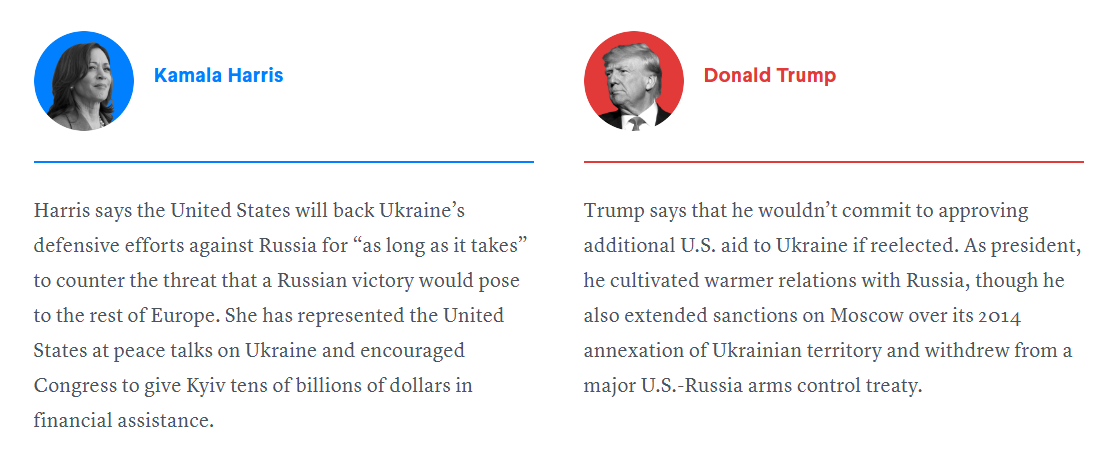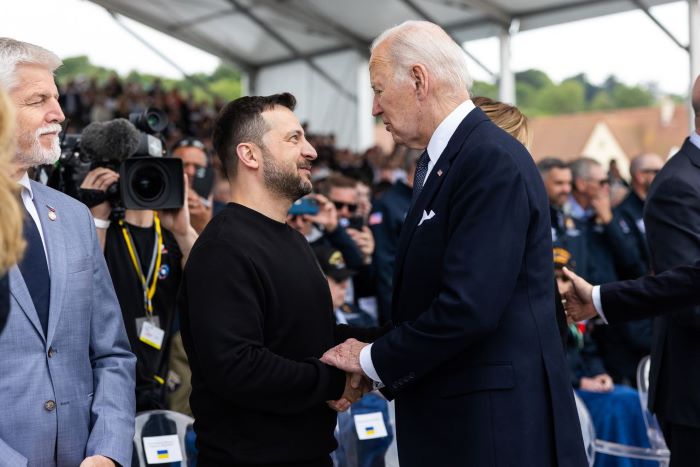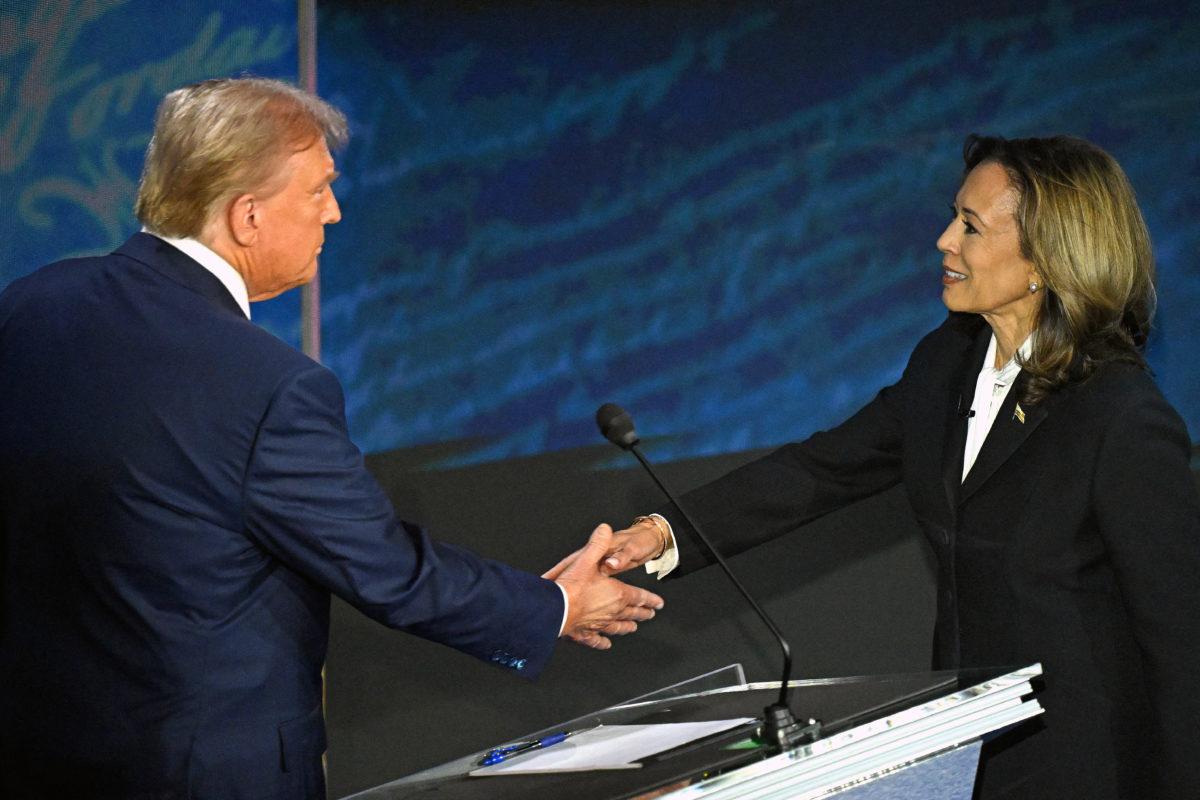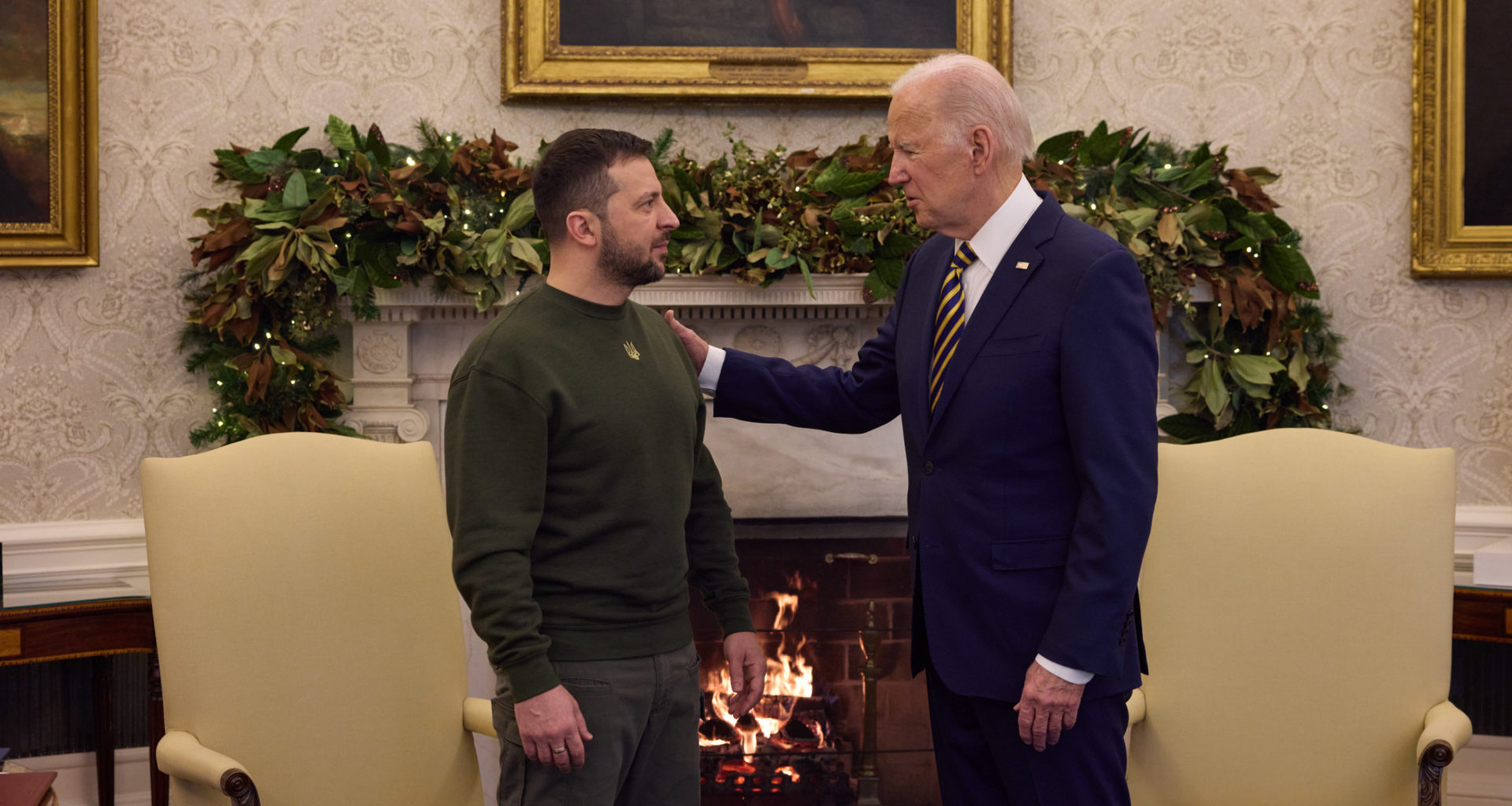As millions of Americans cast their ballots, another country waits with bated breath, watching the race between Democrat Kamala Harris and Republican Donald Trump — Ukraine.
Both candidates are now neck and neck at around 48% among similar voter groups, with Democratic Vice President Harris holding a slight edge in the polls. Yet the final outcome — along with the future of US support for Ukraine — remains far from certain.
As of July 2024, the US has provided Ukraine with €98.4 billion in aid since the start of the full-scale invasion. US support has been especially critical in military aid, accounting for nearly 52% of total international defense assistance given to Ukraine since the invasion began.
However, the country’s lifeline support now teeters on the edge, as its key ally is just days away from deciding who will take the reins from Biden in the Oval Office.
Same promise, colliding agendas
While the sharpest divides between Democratic and Republican candidates center on domestic issues like immigration and abortion, Ukraine still stands as a critical issue on their agendas.
Ukraine’s affairs also stand to be one of the toughest challenges the next president will inherit from the Biden administration. Since late 2023, securing vital aid for Ukraine has become increasingly difficult, with Republicans blocking a $60 billion package for months — signaling growing fatigue over the drawn-out Russian invasion.
While both candidates promise to bring the war in Ukraine to an end, their strategies for achieving the much sought-after peace couldn’t be more at odds.

Democrat Harris vows to uphold the current administration's support for Ukraine "for as long as it takes" and to ramp up sanctions on Russia, which she has actively shaped during her term as Vice President.
Following this line, Harris has crafted her electoral agenda for Ukraine around a firm rejection of ceding territory to Russia for peace, which she has denounced as a "surrender proposal."
Additionally, Harris has backed US leadership in NATO and Ukraine’s future integration into the alliance, although she hasn’t specified a timeline or conditions for a possible accession.
"Kamala Harris firmly supports Ukraine, truly supports,” former State Department senior advisor Jeffrey Stacey said. "This is incredibly good for Ukraine and Russia issues, good for our alliances, and all directions."
In contrast, Republican Trump’s isolationist strategy aims for a "very quick" resolution to the war, although he dodges the question of whether he supports Ukraine’s victory, fueling speculation about his willingness to negotiate peace on terms that favor Russia.
Alongside his criticism of the extensive financial and military aid flowing to Ukraine and calling Europe to shoulder a larger burden, Trump's campaign heightens Kyiv's fears that if elected, the Republican candidate could pressure Ukraine into ceding Russian-occupied territories to the Kremlin.
The message gains traction with Trump’s vice presidential nominee, J.D.Vance, who speculates that Trump's plan to resolve the war in Ukraine might include creating a "demilitarized zone" in territories occupied by Russia.
Alarm bells in Zelenskyy’s office
On 28 October, the Financial Times confirmed Trump's plan to freeze the Ukraine conflict along existing lines of fire and create autonomous regions inside a demilitarized zone, citing sources close to the ex-president.
The plan also places the responsibility for overseeing the peace implementation on Europe while keeping Ukraine out of NATO.
According to Trump’s former aides, Trump believes that derailing Ukraine’s NATO accession could be the key to bringing Russia to the negotiating table, turning his promise to end the war “within 24 hours” into a reality.
The prospect of US pressure to freeze the war raised alarm bells in Zelenskyy’s office, where both the public statements and the newly unveiled “victory plan” firmly reject any concessions within the country’s internationally recognized 1991 borders.
On 29 October, Ukraine's parliamentary foreign affairs committee chair, Oleksandr Merezhko, dismissed Trump’s potential plan, calling it "unrealistic" due to fundamental issues with Russian reliability.
"This plan doesn't look realistic because it implies the agreement of Putin, who is absolutely unreliable and not trustworthy when it comes to observing any agreements," Merezhko told the Kyiv Independent.
According to the lawmaker, the plan aims to breathe new life into the failed Minsk agreements of 2014-2015 while adding enforcement mechanisms and rolling out European troops as peacekeepers.
Merezhko, representing President Zelenskyy's Servant of the People Party, counters that Putin "still believes he can win" and shows no interest in negotiations. He advocates for Zelenskyy's victory plan, insisting that the "only solution" is to “strengthen Ukraine and thereby force Putin to sit at the negotiation table."

Between hope and fear
As Election Day draws near, Ukrainian officials remain on high alert about both candidates. They recognize that no matter who wins, uncertainty about the future of US support will run high.
“No one knows how things will turn out after either candidate is elected,” says Yaroslav Zhelezniak, the first deputy head of Ukraine's Parliamentary Committee on Finance, Tax, and Customs Policy.
Zhelezniak points to the widespread anxiety in Ukraine’s upper echelons that US support for Ukraine — both financial and military — may not be a priority for either candidate in the White House.
He claims that the only hope is that if Harris wins, President Biden might take some decisive action regarding NATO membership before the end of his term and Harris's inauguration on 20 January.
“Regardless of who wins, there's a good chance that nothing will change for Ukraine for at least the next year,” Zhelezniak told Euromaidan Press.
Ukraine’s room for maneuver
However, experts believe that each candidate’s presidency could present unique opportunities for Ukraine to capitalize on — though not always in the ways one might expect.
In the unfolding presidential race, both candidates’ bids largely reflect their party lines, catering more to their supporters' views than expressing their personal convictions or actionable plans on Ukraine policy.
Kamala Harris's swift entry into the campaign has made her strategy heavily reliant on appealing to Biden's voters, while Trump's stance primarily resonates with hardline conservatives within the Republican Party.
This opens up the possibility that, while in office, each candidate may align their policies with congressional influence and the need to rally support from groups they didn't primarily target before the balloting.
Additionally, both candidates’ background could steer their actual foreign policy away from their electoral promises, showering Ukraine with both challenges and opportunities.
Lastly, while the candidates express differing priorities, Ukraine sits at the heart of a nuanced yet strategic US foreign policy priority: countering Russia.
To clarify what to expect from each candidate, Euromaidan Press asked experts to examine the potential benefits and drawbacks of both, as well as the factors Ukraine can leverage regardless of who occupies the White House.

Defense boom amid endless uncertainty
Ukrainian political scientist Ihor Chalenko, head of the Center for Analysis and Strategies think tank, believes that regardless of who wins the White House, Kyiv will have the momentum to advance US-Ukraine defense manufacturing cooperation.
Citing American factories’ interest in ramping up collaboration with Ukraine's defense sector, he insists that the partnership will remain robust, regardless of political changes. The expert expects that established channels through the Pentagon and State Department will remain open, providing a solid backbone to drive the defense cooperation forward.
However, Chalenko is wary about Ukraine’s policy in spheres where corporate interests have less sway, pointing out that neither presidential candidate has laid out a clear and comprehensive vision for future relations with Ukraine.
Kamala Harris expressed continued support for Ukraine and emphasized the need to achieve peace and end the war as Kyiv envisions it. Chalenko views this as a promising signal for the country’s future.
However, the democratic candidate, while supportive in tone, has carefully avoided discussing specific plans for 2025, leaving uncertainty about long-term commitments.
Chalenko also notes that the Biden-Harris approach focuses on a war of attrition until Russia can no longer sustain its offensive, complicating Ukraine’s defense in the long run. With the upcoming election and a change in government, the expert predicts a shift in US focus inward, which may put Harris’s potential support for Ukraine on hold until April 2025.

Currently, Ukraine has access to $5.5 billion in PDA funding and $2.4 billion in USAI funding. The Biden administration has also put forth an ambitious $20 billion loan plan for 2025, potentially funded by frozen Russian assets, though it still needs the green light from Congress.
This uncertainty throws off Ukraine’s planning for its urgent wartime needs like preparations for the heating season and maintaining defenses along the front line.
Trending Now
Chalenko argues that the prospect of a Trump isolationist presidency throws up even more pressing questions that can directly impact the situation in Ukraine.
The Republican's harsh rhetoric towards Zelenskyy and push to halt aid in favor of domestic priorities give a solid reason to assume that, should he win, Ukraine may not receive the same financial backing it had during the Biden administration.
More concerning is the possibility that Trump might tacitly accept Russian de facto control over certain territories without formal recognition — a major shift in US policy, according to Chalenko.
“In other words, the position would be: ‘You consider this territory occupied, but you're not using mechanisms to return it'," Chalenko says.
He also supposes that both potential leaders will likely delay Ukraine's NATO membership aspirations during their term.
While Trump focuses on concerns about NATO funding levels from member states, Harris might offer general support for Ukraine's Euro-Atlantic aspirations without making specific commitments.
The expert forecasts that Ukraine has a limited window — until 20 January — to secure a NATO invitation under the current administration. If that opportunity slips away, Ukraine may have to settle for a "bridge to NATO" compromise rather than the coveted "open door" policy.
Forced peace or protracted war
Vadym Ivchenko, a member of Ukraine's parliamentary defense committee, believes that Trump's business background could lead to quicker decision-making regarding Ukraine. If negotiations with Putin become challenging, Ivchenko thinks Trump might ramp up support for Ukraine to gain leverage over the Kremlin.
“Under Trump's leadership, Ukraine might transform into something akin to a second Israel, with swift decisions on weapons procurement, training programs, and the establishment of American production facilities within Ukrainian borders,” he told Euromaidan Press.
Military aid could slow considerably, and financial support might decrease, though this might be partially offset by increased private sector engagement — whether in trade, training, demining, or equipment maintenance.
This business-oriented scenario, however, depends on a frozen war, as active fighting would deter American corporate involvement, the expert said.
While this corporate-focused strategy could be a win-win for both nations, Ivchenko warns it may lean more toward American interests. Still, Ukraine stands to benefit from stronger bilateral ties along the way.

In contrast, a Harris presidency promises to maintain Biden’s "hold and build" strategy while taking a more cautious, measured approach.
Harris would probably take a more favorable stance on NATO policy than Trump, which prioritizes US-China relations over NATO. However, the expert said her administration's careful approach could leave Ukraine in a drawn-out war for years, hindering its ability to reclaim occupied territory.
Ivchenko brushes off the prospect of Kyiv receiving a NATO initiation before 20 January:
“During the transition period, the unwritten agreements between parties prevent the outgoing administration from making major policy decisions, leaving such matters for the incoming president's team.”
The expert warns that Ukraine is bracing for a turbulent 2025, as US domestic issues are set to take the spotlight — especially if the election results trigger legal battles. This internal focus, combined with unclear funding prospects, could deepen Ukraine's predicament even further.
Ivchenko believes that in this case, Ukraine's fundamental question becomes whether to seek a quick resolution or accept gradual attrition.
On the other hand, increased support, which could significantly boost morale and enable military pushback, seems increasingly out of reach.
In this case, the choice seems to be between negotiating under a Trump presidency or facing a prolonged war under Harris, where some aid may persist at the steep price of more lives lost.
Ivchenko believes that Ukraine should leverage the momentum to secure its steadfast objective: achieving victory over Russia. Zelenskyy’s office defines it not only as Russia's military defeat but also as eroding its global influence and pressuring the Kremlin to yield significant concessions to Kyiv and the broader Euro-Atlantic community.
Neither perfect, both workable
Political scientist and lecturer at Wright State University (Ohio) Liam Anderson believes that both candidates will provide Ukraine with beneficial opportunities to leverage in different areas.
The expert predicts that Democrat Harris would likely continue Biden's current approach to Ukraine, which means providing military aid and weapons to Ukraine, as well as supporting the proxy eroding Russia's military capabilities.
However, the expert believes that her policy regarding Ukraine may come with significant restrictions.
Despite Harris’ active participation in supporting Ukraine under Biden — including broad international advocacy and seven meetings with Zelensyy — her professional background can limit her ability to fulfill foreign policy promises.
“Harris has limited foreign policy experience — it's not her area of expertise. Her background as a California prosecutor has no connection to foreign policy,” Anderson claims.
As a result, despite Harris’s extensive experience in advocating Ukraine’s interests as a vice president, Kyiv should be prepared to give way to domestic issues like childcare on her priority list.
In any scenario, Harris would likely maintain Biden's foreign policy course and not invest significant political capital to support Kyiv.
On the other hand, Trump’s close affiliation with the corporate world could potentially bring unexpected investment opportunities to Ukraine through his business interests – which would require forging peace first.
Anderson believes that Kyiv could seize this opportunity to negotiate peace on its own terms, provided it can tap into Trump's self-interest and create a personal stake for him in the outcome.
However, even in the best-case scenario, Trump’s potential presidency stirs up serious complications.

Trump's foreign policy will likely hinge more on partisan dynamics rather than his personal choices.
He warns about the growing Republican opposition in Congress, calling to repurpose Ukraine aid for American needs, which may pose a more formidable challenge for Kyiv than Trump’s controversial claims.
If Trump clinches victory with Republicans controlling Congress, keeping the US funding flowing could become an uphill battle for Ukraine
Regardless of the election’s outcome, Anderson suggests that Ukraine's future security may depend more on bilateral arrangements akin to US-Japan ties than NATO membership.
He argues that this approach could be more effective for Kyiv, considering that America's reputation could be on the line at that time.
Related:
• 5 ways Russia is trying to sway 2024 US elections
• Yes, Ukraine can win the war – ex-minister decodes victory plan
• Kamala Harris must fix Biden’s mistakes in Ukraine
• Trump’s “peace plan” is a blueprint for Russian victory over Ukraine and West
• Five reasons the West must support Ukraine’s victory, not just survival

